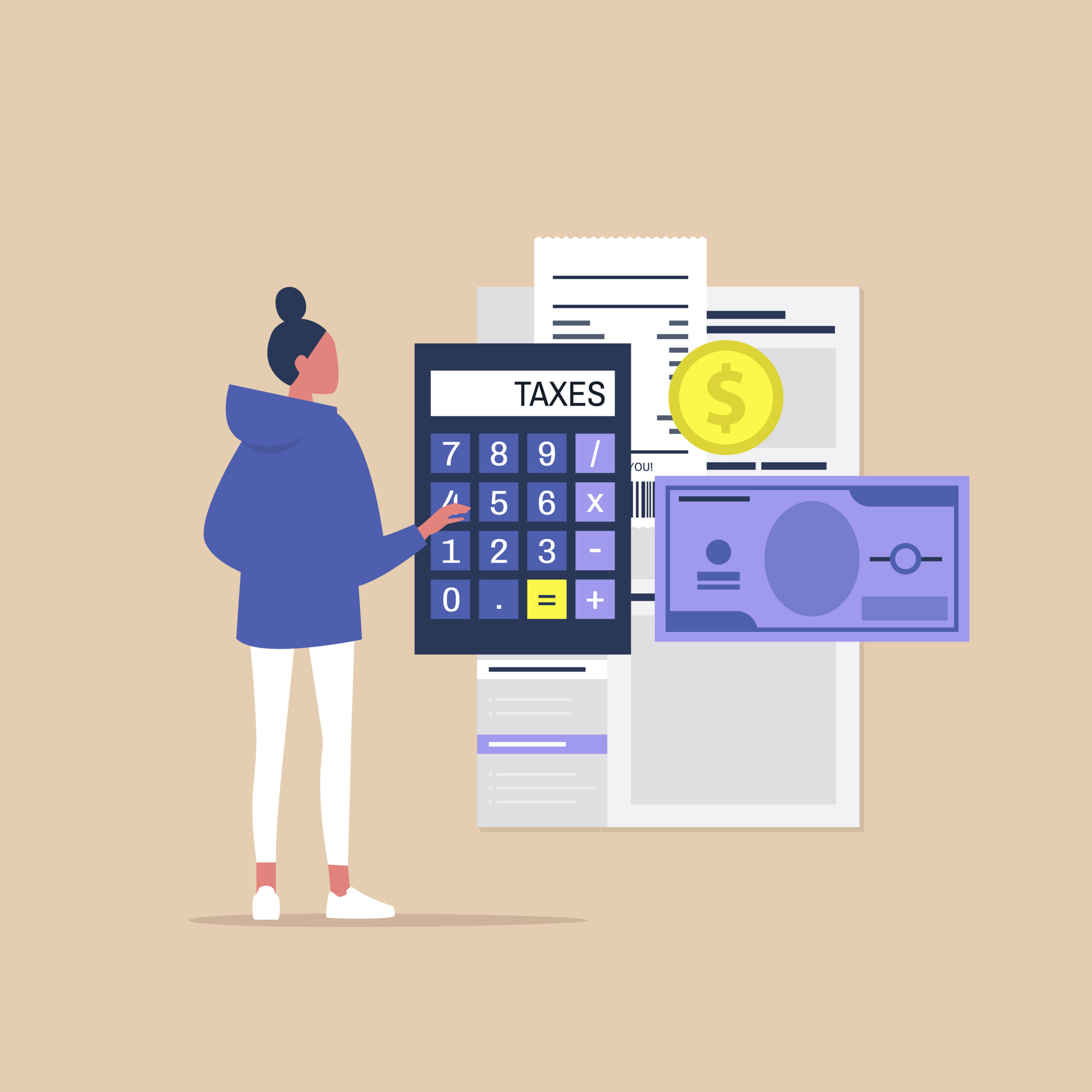It’s that time of year again: the time when you realize taxes are around the corner and proceed to forget about it again until April 14. Just kidding – because you are a hard-working, organized, and on-top-of-it freelancer! Filing 1099s might be one of the most miserable parts of freelance life, however, there are a few basic, but important things that can help you stay prepared and make the most of your tax return.
Before we jump into it, a refresher: everyone pays taxes. While W2 employees get their 7.65% automatically taken out of each paycheck (and their employers pay the other 7.65% for a total 15.3% tax), freelancers have to pay their 15.3% themselves. And while Tax Day is the deadline for everyone to file their returns, full-time freelancers (anyone estimated to owe over $1000 in federal taxes) have to pay estimated taxes on a quarterly basis! Come April, most freelancers will fill out a 1040 Schedule C to report profits and losses related to their self-employment, and the more info you have, the easier it will be to file.
Stay organized and double-check your information!
1099s start coming in from your clients as early as January (January 31 is the deadline for employers to file 1099s), so as soon as you receive your 1099, do yourself a favor and cross-reference the income listed on the 1099 with the invoices that you have just in case there are any mistakes. If there are any discrepancies, the earlier they are resolved, the better. If you receive a mixture of paper and digital 1099s, ensure you either have all forms in one format or another.
Write-offs done right
As a freelancer, tax deductions are the name of the game and make a huge difference in determining how much you owe the feds. A deduction is an amount of money you can subtract from your income, thus reducing the total taxable amount, and yielding a lower amount to taxes. You can claim the Standard Deduction, which for 2023 is $13,850, or, if your itemized deductions related to your business expenses are greater than $13,850, you can go that route.
Business or Personal?
Telling the difference between business expenses and personal expenses can be tricky. For example, typically the costs related to someone’s commute to work are not tax deductible, but for freelancers who work from home, travel expenses directly related to business including lodging, meals, and even laundry are deductible.
On top of that, business deductions can be knotty particularly for freelancers because many times our business and our personal lives overlap. Ideally, you want to have separate credit cards and bank accounts for your business and personal financial dealings. But there are certain things that are unavoidable.
Deduct Proportionally
Not all freelancers have a separate phone line dedicated to all things business, but if you use your personal phone number to conduct business, you can calculate how much of your phone use is dedicated strictly to your business and deduct that proportionate amount.
Same with the home office deduction: if you use part of your home to run your business, you can calculate what percentage of your home you dedicate to your business, apply that ratio to your rent or mortgage, and deduct that monthly amount. One important detail about this is that the part of your home you claim you use for business must be separate and exclusively used for business. Separate office rooms or even clearly segmented parts of a room qualify, but if you are freelancing from the couch, unfortunately, that does not qualify.
The key is to be honest. Did you buy a computer for work but watch Netflix on it in your free time? Try to calculate how much is dedicated to the business and write off that amount.
Other business expenses that you can write off can look like:
- Tech: A computer, monitor, graphics tablet, etc.
- Website Hosting
- Software: Photoshop, InDesign, Final Cut, etc.
- Art supplies
- Storage: Dropbox, IDrive, etc.
- Advertisements: Digital or print (unless it’s for a political party or candidate)
- Assistance: If you paid someone to assist with your work
Educational courses - Self-employment tax: Because W-2 counterparts split that 15.3% of taxes equally with their employer, you can do the same by writing off 50% of your self-employment tax.
Back it up
The most important part of deductions is to have those receipts. Always be sure to have documentation of the purchases and costs you are deducting! No record, no write-off. And if your itemized deductions are less than the standard, then just go standard!
Hire a Tax Preparer
One of the best gifts freelancers can give themselves during tax season is hiring a tax preparer. You’ve already done so much work yourself anyway, so you deserve to take a load off (and not stress yourself out trying to decode the American tax system with 60 tabs open across 4 windows)! And just in case you think hiring a tax preparer is too bougie, over half of all tax returns are filed on behalf of the payers by tax preparers.
Because nothing about taxes is simple, there are different kinds of professionals who can help you with your taxes in slightly different but overlapping ways. When it comes to basic tax filings, Certified Public Accountants (licensed by the state to offer accounting to the public), Tax Attorneys (licensed by the state to practice law), Enrolled Agents (licensed by the IRS to prepare taxes), and non-credentialed tax preparers (not licensed by the state or IRS) can technically file taxes on your behalf but in all cases, the preparer legally must have a Preparer Tax Identification Number or PTIN, which is an identification number given by the IRS.
CPAs have to undergo rigorous education and licensure, but not all CPAs specialize in tax preparation. While tax attorneys are typically best suited for dealing with tax disputes with the IRS, some offer basic tax preparation. Enrolled Agents specialize in taxes and can interface with the IRS easily, but the certification doesn’t guarantee experience. Be sure to do your research and read reviews while cross-referencing with more official databases like state accountancy boards! As you are navigating this web of professionals and how they might be suited to your specific needs, here are a few tips to consider:
- Ask your network for referrals. Talk to friends, family members, fellow 1099ers, or trusted people you’ve worked with about who they hire for tax prep.
- Meet in person. Many high-quality tax preparers offer remote services across states without any issue, but for that added layer of reassurance, it can be helpful to go local. Set up an in-person appointment at an established accounting or tax practice that is open year round, not just during tax season.
- You’re not totally off the hook. Hiring a tax preparer doesn’t mean you can put your feet up. You still need to provide all the information and documentation about what you earned and what you spent and be available with your preparer to answer questions.
- Remember: Nothing about taxes is too good to be true. Unfortunately, scams do happen in the world of tax prep. One of the biggest red flags to keep in mind is the promise of a huge refund. Of course, a big reason to work with a tax preparer is so they can navigate deductions and save you money, but big returns can signal shadiness—especially if the preparers are getting paid a percentage of your return rather than a flat rate. Hopefully, this goes without saying, but if you get a sudden text from the “IRS” demanding you pay your taxes in Amazon gift cards and crypto, please don’t.
Final Tip: Get started last year
The most important part of preparing your taxes is being prepared (imagine that!), and that means getting started early. This might be a bit counterintuitive, but the best way to set yourself up for success in April is to put in the work in January of the previous year.
Doing your taxes is all about being able to clearly track and categorize incoming and outgoing money, so it’s important to set up the infrastructure for that early. Whether you are using an old-fashioned spreadsheet or a project management software like Airtable or Notion, you can create a system that clearly identifies the movement of your projects and your money. The only thing is you have to stay on top of things and keep updating them for the rest of the year.
Other good habits to start early: As soon as you get paid, put at least 25% of the invoice in a separate account for tax purposes. If you have a lot of business expenses, open that separate credit card and make your life that much easier. Consider starting a self-employed retirement plan. Don’t wait til the day you file taxes to calculate how much you owe—start projections early so there are no surprises!
As we all know, nothing in this world is certain except death and taxes, but if you’re a freelancer, how those taxes work can be very uncertain. But by tracking as much as you can in a consistent, organized way, getting a handle on the deductions available to you, and working with an official tax preparer, you can make filing your tax return a little less painful.
About the author.
Sam Mani writes about work, creativity, wellness, and equity — when she’s not cooking, binging television, or annoying her cat.



